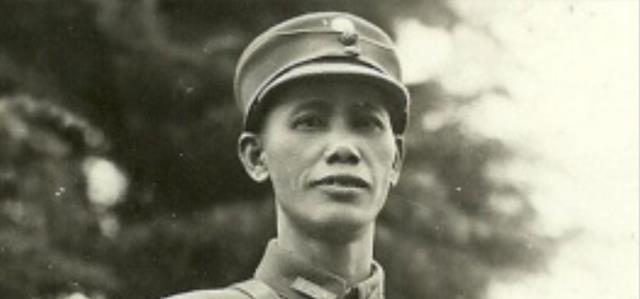After the September 18 Incident, the ambitions of the Japanese invaders to destroy China have become clear. At that time, the Japanese invaders had been coveting the Songhu area for a long time, and tried to create a conflict and seize the opportunity to occupy Songhu. At this time, the 19th Route Army defended Shanghai and fought a bloody battle with the Japanese invaders. During this period, this famous general disobeyed the order and did not withdraw, beat the devil "four times to change the commander", after the founding of the country, the official to the deputy state level, who is this person?

As the saying goes: "The times create heroes", in times of chaos, it is also a time for heroes to stand out. During the War of Resistance Against Japanese Aggression, Cai Tingkai of the 19th Route Army became famous in World War I. With the strength of a lone army, Cai Tingkai let the arrogant Japanese imperialism see the determination of the Chinese army to guard the great rivers and mountains. Cai Tingkai was born in Luoding Prefecture, Guangdong Province, to an ordinary peasant family. Cai's family was not wealthy, his father was a veterinarian and also worked as a tailor. It can be said that Cai Tingkai lives in a very difficult environment. Despite this, cai Tingkai still has a dream in his heart to join the army and serve the country. When Cai Tingkai was 18 years old, he secretly joined the New Army without his family. Since then, Cai Tingkai officially began his military career of joining the army and serving the country. On the battlefield, Cai Tingkai bravely went forward, daring to fight and dare to rush. Cai Tingkai fought bravely and his mind was flexible, and it didn't take long for him to go from a small soldier to a division commander. Later, the Nationalist government reformed the army, and Cai Tingkai became the commander of the 19th Route Army. Since then, Cai Tingkai has also become a great general on the town guard side.
After the September 18 Incident, Cai Tingkai led the soldiers of the 19th Route Army to take charge of the defense work along the Beijing-Shanghai line. In 1932, the Japanese army attempted to invade Shanghai. During this time, Japan once again played the 918 routine. The Japanese attempted to put pressure on the Nationalist government to force the 19th Route Army to retreat 15 kilometers backwards. The Nationalist government could only gladly accept the unreasonable demands of the Japanese side, but Cai Tingkai justifiably refused. To this end, Cai Tingkai did not hesitate to disobey the Nationalist government's order to withdraw. Cai Tingkai declared to the Japanese side: Shanghai is China's territory, the 19th Route Army is China's army, and it is the responsibility of the 19th Route Army to guard Shanghai.
"This is Shanghai, not Tohoku, and it is completely impossible for Japan to repeat the same trick." If the Japanese wanted to invade Shanghai, the 19th Route Army would have stubbornly resisted. Cai Tingkai sent a telegram to the whole country, informing the people of their country that it was their duty to guard the land. Subsequently, Cai Tingkai gathered the officers and men of the 19th Route Army and preached to all the officers and men: "The 19th Route Army resisted Japan to save the country and protect the family, and even if it fought until one soldier or a pawn fought, it would never back down." At this time, Japan saw that the 19th Route Army had a tough attitude, so it was impossible to repeat the trick. Subsequently, Japan gathered its troops and launched a fierce attack on Shanghai. What the Japanese did not expect was that Cai Tingkai was not only a patriotic general, but also an excellent commander who could recruit good warriors.
General Cai Tingkai led the 19th Route Army to resolutely resist the Japanese invasion, and successfully resisted the pace of the Japanese attack and turned the Japanese army out. The 19th Route Army resisted the Japanese army in Shanghai for 33 days, using the bloodiness of Chinese soldiers to let the Japanese army see what a Chinese soldier was. In this short period of 33 days, the Japanese army was forced to change commanders four times. Despite this, the Japanese side still failed to do so. After the end of the war, Cai Tingkai became famous. For a time, the people of the whole country were loudly shouting, and old Jiang could only be forced to forget that Cai Tingkai had disobeyed the order. Subsequently, the Nationalist government awarded Cai Tingkai the Order of the Blue Sky and White Sun, a general of the first rank in the army. In 1949, Cai Tingkai attended the Preparatory Committee of the New CPPCC and the First Plenary Session of the CPPCC, and was elected as a standing committee member of the CPPCC. In 1964, Cai Tingkai served as vice chairman of the National Committee of the Chinese People's Political Consultative Conference, and rose to the rank of vice minister. In 1968, Cai Tingkai died of illness at the age of 76. When the country was in crisis, General Cai Tingkai was desperate to guard the land behind him. Cai Tingkai's deeds are really a big husband. In the face of the great national righteousness, Cai Tingkai did not hesitate to disobey Shangfeng's orders, so that he was really a model of the times.